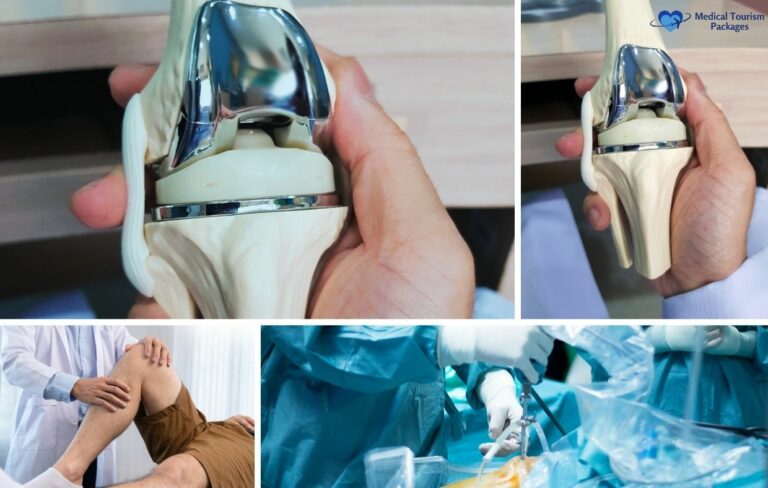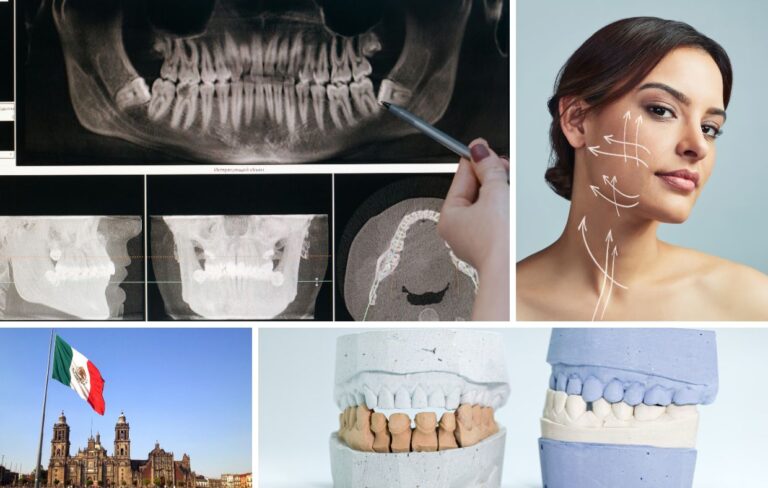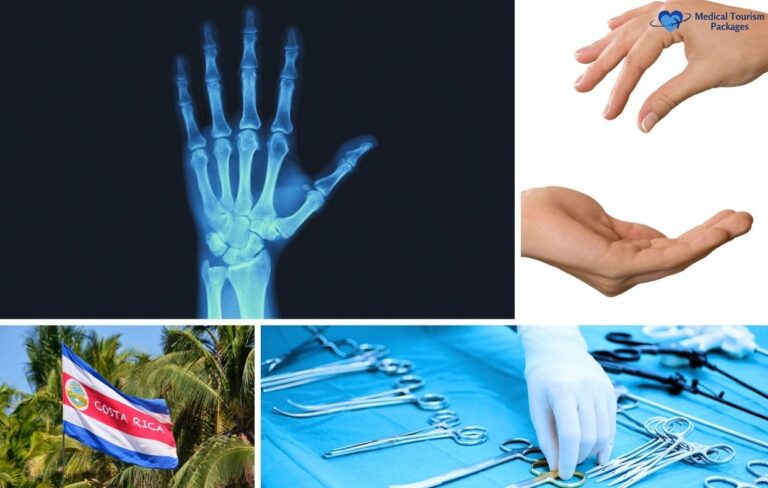Book Appointment Now
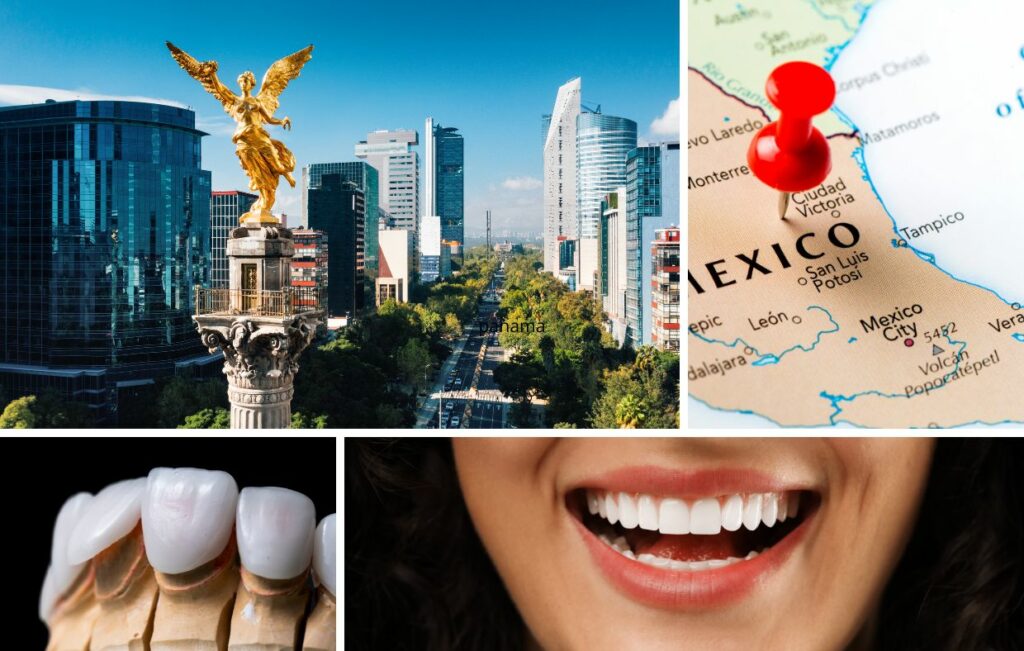
Dental Implants in Mexico: Cost, Process, Best Clinics, and Safety Guide
Over 1.2 million Americans travel to Mexico annually for dental implants, saving 50% to 80% compared to US prices while receiving the same premium materials and technology. This guide covers costs, clinic selection, safety standards, and the complete treatment process.
What Are Dental Implants, and Why Are They Important?
Dental implants are titanium posts surgically placed into your jawbone to replace missing tooth roots. Once the bone fuses with the titanium through osseointegration, the implant anchors crowns, bridges, or dentures permanently. Unlike traditional dentures that sit on gums, implants become part of your jaw structure, preventing bone loss and maintaining facial structure.
Demand for dental implants has surged, making them the largest revenue-generating dental service in 2024. However, US costs are prohibitive: a single implant runs $3,000 to $7,000, and full mouth restoration exceeds $60,000. Most dental insurance caps annual benefits at $1,000 to $2,000—barely enough for one implant. This drives Americans to Mexico, where identical procedures cost $1,200 to $2,000 per implant, making treatment financially accessible.
Mexico has built sophisticated infrastructure for medical tourism in Mexico: specialized transportation services, recovery-focused hotels, bilingual staff, and dedicated patient coordinators who manage every detail from airport pickup to scheduling.
How dental implants in Mexico differ from the US: The core medical procedure is identical—the differences lie in service delivery. Top Mexican clinics use the same premium brands (Straumann and Nobel Biocare), advanced technology (3D CBCT scanners and in-house CAD/CAM labs that design and mill prosthetics on-site within 5-10 days), all-inclusive packages bundling treatment with hotel accommodations and private transportation, dedicated bilingual coordinators managing all logistics, and faster final restoration delivery (days versus weeks at US clinics that outsource to external labs).
Why Americans choose Mexico for dental implants: The primary drivers are verified savings of 50-80% (full mouth restoration costing $60,000 in the US runs $12,000-$16,000 in Mexico including travel), geographic proximity (border cities are drivable from California/Arizona; resort destinations require only 2-3 hour flights), mature infrastructure (medical-focused hotels, expedited border crossing passes, formal US-Mexico clinic partnerships), and high-volume expertise (top implantologists perform complex procedures like All-on-4 hundreds of times annually versus occasionally in the US).
How Much Do Dental Implants Cost in Mexico Compared to the US and Canada?
A complete All-on-4 procedure in Mexico costs approximately $10,000. Add two round-trip flights ($1,000) plus two 7-day hotel stays with meals ($1,400) for a total of $12,400—versus $25,000 to $35,000 in the US without any travel costs. The dental procedure represents 80% of total trip costs, with travel (10%) and accommodation (10%) making up the remainder.
Price comparison by procedure:
| Procedure Type | US Cost | Mexican Cities | Savings |
|---|---|---|---|
| Single Implant | $3,000-$7,000 | $1,100-$2,000 | 60-75% |
| Full Mouth Restoration | $60,000-$90,000 | $16,000-$27,000 | 60-70% |
| All-on-4 (Acrylic) | $20,000-$30,000 | $6,500-$13,000 | 55-70% |
| All-on-4 (Zirconia) | $25,000-$35,000 | $8,000-$15,000 | 50-65% |
City Price Ranges:
- Border towns (Tijuana, Los Algodones): Lowest prices (~$9,000-$10,000 All-on-4)
- Resort destinations (Cancun, Puerto Vallarta): Slightly higher (~$11,500-$12,000 All-on-4) due to overhead
In the US, upgrading from acrylic to zirconia adds $5,000-$10,000 per arch. In Mexico, the upgrade costs only $600-$800—meaning you can receive premium zirconia in Mexico for less than base-level acrylic costs in the US.
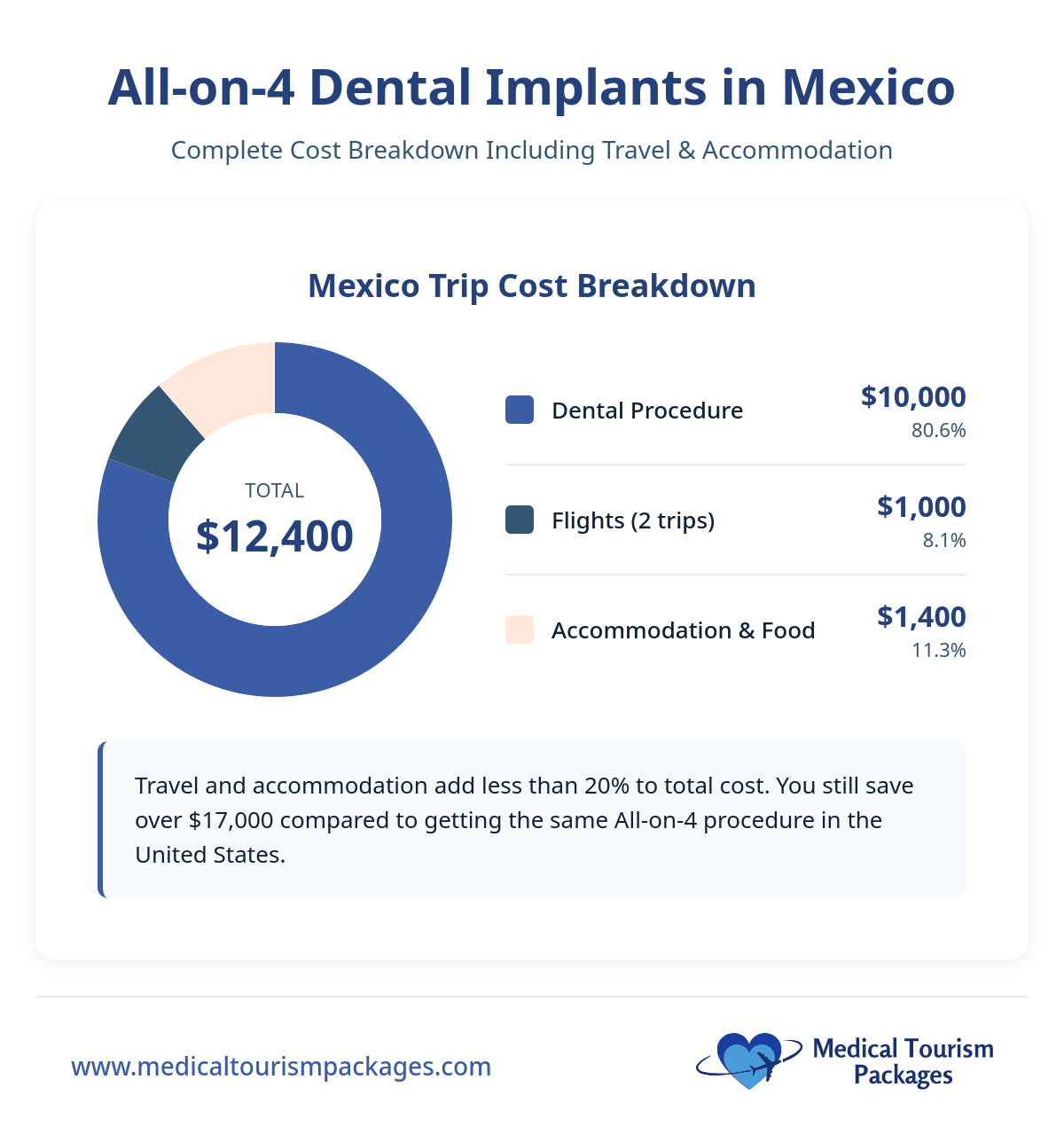
What Are the Advantages of Getting Dental Implants in Mexico?
WHY THIS MATTERS TO YOU: Understanding both advantages and risks helps you make an informed go/no-go decision before investing time researching specific clinics.
- Transformative cost savings: $15,000 to $50,000 saved on full mouth restoration without compromising quality
- Same quality at vetted clinics: Identical materials, technology, and surgical principles as top US practices
- On-site CAD/CAM labs: Fast turnaround for permanent restorations during your 5-10 day trip
- Refined surgical expertise: High-volume clinics where surgeons perform hundreds of cases annually
- Emerging US-Mexico partnerships: Formal arrangements where Mexican clinics share digital records with US dentists for coordinated follow-up care
What Are the Disadvantages of Getting Dental Implants in Mexico?
- Continuity of care challenges: Complications (though rare) are logistically and financially difficult to manage from the US
- Warranty travel costs: Clinic warranties cover replacement parts but not your $1,000+ travel costs to return for repairs
- US dentist reluctance: Many US dentists won’t service foreign dental work due to liability concerns and inability to identify implant systems
- “No-name” implant risk: Obscure implant brands leave you dependent on returning to Mexico for all future service
- Rushed timelines: Some clinics promise “permanent teeth in 3 days”—a red flag indicating they’re skipping the required 3-6 month osseointegration period
- Variable sterilization standards: Studies show 7-10% of Mexican dental offices have inadequate sterilization protocols
What Types of Dental Implants Are Available in Mexico?
Mexican clinics offer three primary implant approaches, each suited to different patient needs:
| Implant Type | What It Is | Process | Best For | Key Notes |
|---|---|---|---|---|
| Traditional | One titanium implant per missing tooth (post + abutment + crown) | Two trips: Surgery with temporary crown (Trip 1), permanent crown after 3-6 months (Trip 2) | Patients missing only a few teeth with good bone density | Standard approach with proven long-term success |
| All-on-4 / All-on-6 | Full arch restoration using 4 or 6 strategically angled implants supporting a bridge of 10-12 teeth | Two trips: Surgery with temporary bridge (Trip 1), permanent restoration after healing (Trip 2) | Full mouth restoration, patients wanting to avoid extensive bone grafting | Nobel Biocare pioneered All-on-4; All-on-6 adds $2,000-$3,000 for softer bone or heavy bite force |
| Mini Implants | Smaller-diameter implants (under 3mm) for denture stabilization | Sometimes single-trip with immediate loading | Stabilizing loose dentures (not for fixed bridges) | Not suitable for heavy chewing; higher failure rates; most top clinics focus on traditional and All-on-4/6 |
How Do Dental Implants in Mexico Work?
The process follows the same biological principles as US procedures: titanium post placement, 3-6 month osseointegration period for bone fusion, then permanent restoration attachment.
Materials used: Top Mexican clinics use globally recognized brands—Straumann (Switzerland) with advanced Roxolid® titanium-zirconium alloy offering exceptional success rates and global serviceability, or Nobel Biocare (Switzerland), the original All-on-4 pioneer with official Mexican presence. Brand matters critically: global brands ensure any US dentist can identify your implant and order compatible parts. “No-name” or obscure Chinese/Korean implants trap you into returning to Mexico for all future service since US dentists can’t order compatible components. Always demand to know the brand before surgery and get it in writing.
Prosthesis options: Acrylic (lightweight, easier to repair, stains over time) versus zirconia (premium ceramic, incredibly strong, stain-resistant, lasts 15-20+ years). In Mexico, zirconia costs only $600-$800 more than acrylic—making premium material affordable.
What Is the Dental Implant Procedure Process?
Critical first step: 3D Cone Beam CT (CBCT) scan creates a three-dimensional map of your jawbone, showing bone density and exact nerve/sinus locations. Standard 2D X-rays are insufficient—if a clinic only offers 2D imaging, this is a major red flag. Without 3D mapping, surgeons risk nerve damage causing permanent facial numbness.
Surgery day sequence:
- Anesthesia (local with optional sedation)
- Extractions if needed
- Bone grafting if insufficient bone volume
- Implant placement using precision-guided drilling
- Temporary prosthesis attachment (for full-arch procedures)
- Suturing
Single implants take 1-2 hours; All-on-4 takes 3-4 hours per arch.
How Long Does the Dental Implant Process Take in Mexico?
Two separate trips are required, separated by 3-6 months of healing:
Trip 1 (5-10 days): Initial consultation, 3D scans, surgical planning (days 1-2), surgery with temporary prosthesis placement (days 3-5), recovery monitoring and clearance to fly home (days 6-10).
Healing phase (3-6 months at home): Osseointegration—jawbone fuses with titanium implants. Rushing this process by placing heavy permanent bridges on unhealed implants is a primary cause of implant failure.
Trip 2 (5-10 days): Implant exposure and final abutment placement (days 1-3), in-house CAD/CAM lab designs and mills permanent prosthesis (days 4-9), final fitting and permanent attachment (day 10).
On-site CAD/CAM capability enables 5-10 day delivery of permanent restorations. US clinics outsourcing to external labs may require weeks.
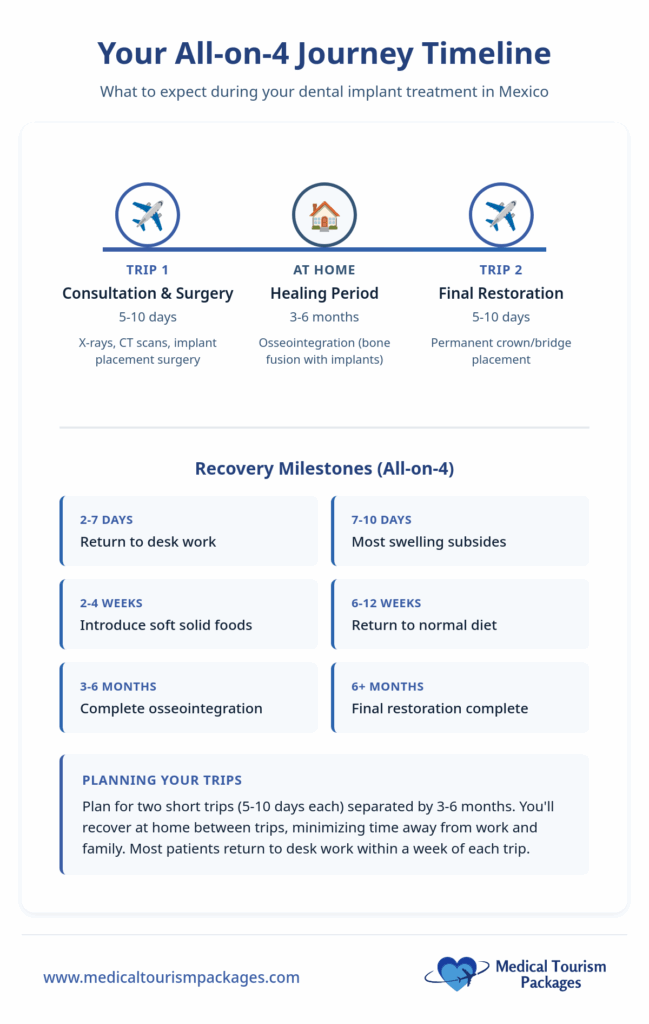
Which Mexican Cities Are Best for Dental Implants?
The best cities for dental implants in Mexico are Tijuana, Los Algodones, Cancun, and Puerto Vallarta
| City | Location | Key Advantages | Average All-on-4 | Best For |
|---|---|---|---|---|
| Tijuana | Border (San Diego adjacent) | Drive-in access, FastLane border passes (15-30 min crossing vs. 2-4 hrs), lowest prices, easy warranty returns | ~$9,000 | Cost-focused patients, warranty accessibility |
| Los Algodones | Border (Yuma, AZ area) | Walk-over border access, 600+ dentists in “Molar City,” popular with snowbirds, only AACD-accredited dentist in Mexico | ~$10,000 | Arizona/California residents, retirees |
| Cancun | Resort destination | Luxury recovery environment, dental vacation model, beachfront hotels, clinic-arranged private transport | ~$11,500 | Patients combining treatment with vacation, those with companions |
| Puerto Vallarta | Resort destination | Similar to Cancun with slightly lower prices, less crowded, Pacific coast alternative | ~$12,000 | Vacation-focused recovery |
WHY THIS MATTERS TO YOU: City selection affects total cost, warranty accessibility, and risk management. Border towns make warranty claims practical (drive back), while resort destinations offer recovery comfort.
Border towns serve cost-focused, drive-in markets. Resort destinations bundle services as concierge packages with higher overhead but offer recovery amenities.
How Do You Choose the Best Dental Clinic in Mexico for Implants?
Top implantologists in Tijuana and Cancun perform All-on-4 hundreds of times annually, building refined expertise. However, the business model incentivizes selling high-value procedures, creating pressure. Always seek a second opinion from your US dentist before committing.
Essential certifications to verify:
- Cédula Profesional: Non-negotiable mandatory license issued by Mexico’s Ministry of Education. Verify online at Registro Nacional de Profesionistas.
- ISO 9001: Strongest quality signal—third-party audit of entire clinic’s quality management systems, sterilization protocols, and administrative processes.
- ADM (Mexican Dental Association): Membership requires ongoing education. Positive signal.
- ADA International Membership: Demonstrates commitment to US standards but is NOT clinic accreditation (beware misleading “ADA-accredited” claims).
- AACD (American Academy of Cosmetic Dentistry): Extremely rare, rigorous credential. Dr. Isaías Íñiguez in Los Algodones is the only AACD-accredited dentist in Mexico.
Critical questions to ask before choosing:
- “What is the full name and Cédula Profesional number of my surgeon?” (Refusal is a red flag)
- “What implant brand will I receive, in writing?” (Demand specifics, not “depends on stock”)
- “Do you use 3D CBCT scans or only 2D X-rays?” (2D only = walk away)
- “Do you have on-site CAD/CAM labs or use external labs?”
- “What is your implant success rate and annual All-on-4 volume?”
- “What does your warranty cover, and does it include my travel costs?” (Answer will be no—forces transparency)
- “Can I speak directly with the surgeon, not just the coordinator?”
How to verify credentials: Visit Mexico’s National Registry (Registro Nacional de Profesionistas) at www.cedulaprofesional.sep.gob.mx. Enter the dentist’s name or Cédula number to confirm valid license and specialty credentials. Refusal to provide this information means walk away.
Identifying legitimate vs. fake reviews: Legitimate reviews contain specific details: surgeon names, procedure timelines, actual costs, balanced perspectives mentioning minor negatives. Fake reviews use generic praise without substance. Cross-reference across platforms (Google, Facebook, RealSelf, medical tourism forums). Authentic clinics have organic reviews distributed across multiple sites. Repeated mentions of identical problems (aggressive upselling, hidden fees, poor follow-up) in negative reviews are red flags.
What Are the Step-by-Step Details of Getting Dental Implants in Mexico?
Getting dental implants in Mexico involves multiple coordinated phases: pre-travel preparation, initial consultation and surgical planning, the implant surgery itself, recovery monitoring, and long-term follow-up care. Understanding each phase helps you prepare properly and avoid common pitfalls.
What Should You Do Before Traveling to Mexico for Dental Implants?
- Secure travel documents: Valid US Passport or Passport Card mandatory. For stays over 7 days, obtain Forma Migratoria Múltiple (FMM) tourist permit online or at port of entry ($35, valid 180 days).
- Consult your US dentist: Ask if they’ll provide pre-trip records and perform post-operative check-ups. If they refuse follow-up care, find a new dentist before booking treatment. Many won’t service foreign dental work.
- Questions to ask your US dentist:
- “Will you provide my dental records for a Mexican consultation?”
- “Will you perform routine cleanings and check-ups after I return?”
- “What implant brands are you able to service?” (Tells you which brands to demand in Mexico)
- Purchase medical travel insurance: Policies like Medical Travel Shield cover return travel costs if complications arise, filling the “warranty gap.”
- Prepare soft-food meal plan: Stock home with yogurt, mashed potatoes, protein shakes, soups for weeks of recovery.
How Do You Prepare for Your Initial Consultation in Mexico?
Bring copies of US dental records and X-rays. During consultation, expect 3D CBCT scan, intraoral photos, comprehensive oral exam, and detailed cost breakdown. Ask surgeon to explain risks specific to your case (bone loss, medical conditions affecting healing). Get everything in writing: total cost, what’s included, implant brand, prosthetic material, warranty terms, timeline. Never agree to treatment the same day—take the plan home, review carefully, and seek second opinions.
What Happens During the Dental Implant Surgery in Mexico?
You’ll receive local anesthesia with optional sedation. For full-arch procedures, the surgeon extracts failing teeth, places implants at pre-planned angles, and attaches a temporary acrylic bridge the same day. Post-operative care includes pain medication (ibuprofen/acetaminophen), antibiotics, antimicrobial rinses, and strict dietary restrictions. Follow-up appointment 2-3 days post-surgery checks healing and provides travel clearance.
What Is the Recovery Process After Getting Dental Implants in Mexico?
| Recovery Milestone | Single Implant | All-on-4 (Full Arch) |
|---|---|---|
| Return to Work | 1-3 days | 2-7 days (desk job) |
| Return to Normal Diet | 7-10 days | 6-12 weeks soft food only |
| Full Osseointegration | 3-6 months | 4-6 months |
| Final Restoration (Trip 2) | 4-6 months | 4-6 months |
All-on-4 requires strict soft-food diet for 6-12 weeks to avoid placing excessive force on healing implants. Temporary prosthesis functions like a cast on a broken bone—protects while healing, but can’t handle full load yet.
What Follow-Up Care Is Needed After Returning Home?
Implants require maintenance identical to natural teeth: brushing, flossing with specialized tools, professional cleanings every 6 months. Your US dentist (if they agreed to provide care) should monitor healing and perform routine maintenance. Minor adjustments like bite refinement or screw tightening are feasible if you chose a globally recognized implant brand. However, warranties are voided if another dentist performs major repairs. For warranty-covered complications, you must return to the Mexican clinic at your expense for travel.
How Do You Handle Travel and Accommodation for Dental Implants in Mexico?
Most clinics offer all-inclusive packages bundling treatment with logistics, though border town patients typically handle their own arrangements. Understanding package contents and accommodation options helps you budget accurately and choose the right support level for your situation.
What Are Dental Tourism Packages, and Do They Include Travel?
All-inclusive packages bundle treatment, hotel accommodation at partner properties, private ground transportation (airport pickup, hotel-clinic transfers), and dedicated bilingual coordinator—but NOT airfare. Packages cost $2,500-$3,500 more than standalone treatment but eliminate stress of navigating foreign logistics. Border town clinics less frequently offer packages since patients drive in and stay on US side.
Where Should You Stay When Getting Dental Implants in Mexico?
| Type | Features | Price | Best For |
|---|---|---|---|
| Partner Hotels | US chains (Holiday Inn, Marriott), standard amenities, clinic shuttle | ~$65/night | Patients with companions, single implants |
| Recovery Boutiques | 24/7 nursing care, hospital-style beds, soft-food meals, wound care | $140-$170/night | Solo travelers, major surgery (All-on-4), medical monitoring needs |
For solo travelers undergoing All-on-4, the extra $500-$700 for recovery boutique versus standard hotel provides valuable medical monitoring and immediate professional help if complications arise.
Border town patients often stay on US side (San Diego for Tijuana, Yuma for Los Algodones) and cross daily for appointments.
What Are the Safety and Quality Standards for Dental Implants in Mexico?
Dental implants at properly vetted Mexican clinics are as safe as US procedures. The surgical principles, technology, and materials are identical. Safety depends entirely on which clinic you choose.
Reputable clinics with ISO 9001 certification adhere to international sterilization protocols comparable to US standards. However, studies identified sterilization failures in 7-10% of Mexican dental offices tested. Choose clinics based on verifiable certifications, not price alone.
Success rates for All-on-4 at top Mexican clinics are 95-98% with complication rates below 5%—matching US and international benchmarks. The key factors are surgeon expertise, premium implant brands, 3D CBCT surgical planning, and patient compliance with post-operative care.
High case volume at top Mexican clinics can improve outcomes. Surgeons performing All-on-4 five times weekly (250+ cases/year) develop refined technique versus US dentists performing it monthly (12 cases/year).
What Happens If Something Goes Wrong with Your Dental Implants in Mexico?
Mexico has CONAMED (National Commission for Medical Arbitration)—a free government arbitration system for medical disputes. It offers conciliation and binding arbitration significantly faster (171-286 days average) than US medical malpractice lawsuits (2-5 years). CONAMED is accessible to foreign patients and can award financial compensation. This provides structured legal recourse that’s actually faster than the US civil court system.
WHY THIS MATTERS TO YOU: One of the biggest fears about medical tourism is “I’ll have no legal recourse if something goes wrong.” CONAMED directly addresses this fear with a free, structured arbitration process specifically designed to protect patients.
What Payment and Insurance Options Are Available for Dental Implants in Mexico?
Understanding payment structures and insurance reimbursement processes is critical for accurate budgeting. While dental implants in Mexico cost 50-80% less than US procedures, navigating payment timing and insurance claims requires planning.
Does Insurance Cover Dental Implants in Mexico?
Many US PPO plans (Aetna, Cigna, Delta Dental, UnitedHealthcare) offer out-of-network reimbursement for Mexican dental work. You pay the clinic 100% upfront, then submit itemized bill and X-rays to your insurer for reimbursement—typically 50-80% of the Mexican cost (not US cost). If your implant cost $1,500 in Mexico and your plan reimburses 60%, you receive $900 back, netting $600 out-of-pocket. The same implant in the US would cost $5,000 with $1,000 out-of-pocket after insurance—more than your total Mexico cost.
The challenge is cash flow: you need the full amount upfront, then wait 4-8 weeks for reimbursement.
Payment methods accepted: Clinics accept cash (US dollars or pesos), credit cards (3-5% processing fee), and wire transfers. Most require 25-50% deposit at booking with balance due before surgery. Always request detailed receipt in English with itemized charges and procedure codes for insurance reimbursement.
Are Financing Options Available for Dental Implants in Mexico?
Some clinics partner with financing companies (Care Credit, Mexican providers) offering payment plans with credit checks and interest charges (0% promotional periods to 15-25% for longer terms). US-based options include Care Credit, personal loans, 0% APR credit cards, or home equity lines of credit. Health savings accounts (HSAs) and flexible spending accounts (FSAs) can be used for Mexican dental expenses using pre-tax dollars.
What Warranty and Guarantee Options Come with Dental Implants in Mexico?
Reputable clinics offer 5-10 year warranties on implants (Straumann/Nobel) and 2-5 year warranties on crowns/bridges. Warranties cover material defects and implant failure—the clinic replaces failed parts and performs repairs at no charge.
However: Warranties do NOT cover your travel costs to return to Mexico. If a $900 implant fails, the clinic replaces it free, but you pay $1,000+ for flights and hotels. This “warranty gap” makes border towns (Tijuana, Los Algodones) strategically superior—a drive versus an expensive flight.
Warranties typically cover: Implant integration failure, prosthetic material failure, manufacturing defects
Warranties do NOT cover: Your travel costs, damage from neglect (smoking, poor hygiene, teeth grinding without night guard), modifications by other dentists, natural complications (gum disease, trauma, medical conditions developing after treatment)
Medical travel insurance (e.g., Medical Travel Shield) fills the warranty gap by covering return travel costs if complications arise requiring medically necessary return trips.
What Are Common Concerns About Getting Dental Implants in Mexico?
Medical tourists considering Mexico frequently ask about safety, quality, language barriers, and what happens if something goes wrong. This section addresses the most common concerns with evidence-based answers and practical risk mitigation strategies.
What If You Need Emergency Care After Returning Home?
The most effective risk mitigation is a three-part “insurance” stack:
WHY THIS MATTERS TO YOU: This three-layer strategy transforms dental tourism from a risky gamble into a calculated risk. Layer 1 protects your future (US dentists can work with known brands), Layer 2 protects your wallet now (insurance reimbursement reduces upfront cost), Layer 3 protects you from the warranty trap (covers hidden cost of “free” repairs).
- Implant Brand (Long-Term Insurance): Demanding premium globally recognized brands (Straumann, Nobel Biocare) ensures any US dentist can identify your implant and order compatible parts. “No-name” implants trap you into returning to Mexico for all service.
- US PPO Insurance (Cost Recovery): PPO plans provide mechanism to recoup 50-80% of Mexican costs through out-of-network reimbursement.
- Medical Travel Insurance (Warranty Gap Protection): Specialized policies cover travel costs for complications. Clinic warranties cover replacement parts/procedures but NOT your $1,000+ travel costs to return for repairs.
Is There a Language Barrier When Getting Dental Implants in Mexico?
No. Top clinics catering to US and Canadian patients employ bilingual patient coordinators who speak fluent English and serve as your primary contact throughout the process. Dentists and surgeons at international patient-focused clinics typically speak professional-level English, having completed training programs taught in English or attended US continuing education courses. Support staff (receptionists, dental assistants) are also bilingual. In border cities like Tijuana and Los Algodones, as well as resort destinations like Cancun, English is widely spoken in hotels, restaurants, and businesses serving American tourists. Language barriers are not a significant obstacle at vetted clinics.
Can You Get the Same Quality of Care in Mexico as in the US?
Yes, at properly vetted clinics. Patient testimonials consistently report facilities “are no different than in the States” with “state of the art equipment.” Top Mexican clinics use the same technology (3D CBCT scanners, digital intraoral scanners, on-site CAD/CAM labs), the same materials (Straumann and Nobel Biocare implants, zirconia prosthetics), and follow the same surgical techniques based on peer-reviewed research. Mexican implantologists attend the same international training conferences and learn from the same thought leaders as US counterparts. The key is clinic selection—elite Mexican clinics with ISO 9001 certification, credentialed surgeons, and hundreds of verified patient reviews deliver care indistinguishable from elite US clinics.
Are Mexican Dental Implants Made with Inferior Materials?
Not at top-tier clinics. Low-cost clinics do use inferior “no-name” implants from obscure manufacturers (often Chinese or Latin American brands) lacking research backing and international recognition. However, reputable Mexican clinics use the exact same premium implant brands as elite US practices: Straumann, Nobel Biocare, Zimmer Biomet, and Dentsply Sirona. The implant brand you receive depends entirely on which clinic you choose and what you demand in your treatment contract. Before agreeing to surgery, demand to know the implant brand and get it in writing. If a clinic refuses to disclose the brand, claims “all implants are the same,” or says “it depends on what we have in stock,” walk away immediately.
How Do You Protect Yourself If the Clinic’s Warranty Doesn’t Cover Travel Costs?
The “warranty gap” is real: clinics cover replacement parts and procedures but not your $1,000+ travel costs to return to Mexico for repairs. Three strategies protect you:
- Choose border towns over resort destinations: Tijuana and Los Algodones are drivable from California/Arizona, making warranty returns a manageable 3-hour drive versus an expensive $800+ flight to Cancun. This alone can save $1,500-$2,000 in warranty-related travel costs.
- Purchase medical travel insurance: Policies like Medical Travel Shield ($200-$500 for 1-2 years coverage) specifically cover return travel, accommodation, and daily living expenses if complications arise requiring medically necessary return trips. This fills the warranty gap regardless of clinic location.
- Factor warranty accessibility into city selection: If you choose a resort destination, understand that a “free” warranty repair could cost $1,900-$2,400 in travel expenses. Budget accordingly or accept the risk.
Why Choose Mexico Over Other Dental Tourism Destinations?
Mexico’s decisive advantage is geographic proximity. Border towns like Tijuana and Los Algodones are drivable from California and Arizona—if something goes wrong, you’re a 3-hour drive away, not a $2,000 international flight away. Even resort destinations like Cancun require only 2-3 hour flights from most US cities versus 15+ hours to Turkey or 6+ hours to Colombia.
Mexico vs. Costa Rica: Mexico offers drivable border access and more established infrastructure at comparable or lower pricing.
Mexico vs. Colombia: Mexico eliminates long international flights, has established US-Mexico clinical partnerships, and provides easier follow-up care access.
Mexico vs. Turkey: Mexico avoids 15+ hour flights, extreme time zone differences, and the logistical nightmare of accessing warranty service from opposite sides of the planet.
For US and Canadian patients, geography is the deciding factor—Mexico’s proximity makes follow-up care and warranty returns feasible in ways no other dental tourism destination can match.
Who Is a Good Candidate for Dental Implants in Mexico?
Patients with bone loss: Moderate to severe bone loss may require bone grafting before implant placement, adding a third trip and extending treatment to 8-12 months. All-on-4/All-on-6 procedures angle implants to avoid bone-deficient areas, often eliminating grafting needs. A 3D CBCT scan during initial consultation reveals whether you have sufficient bone. Many Mexican clinics offer free virtual consultations where you upload X-rays for preliminary assessment before booking travel.
Seniors and older adults: Age alone doesn’t disqualify implants—patients in their 70s, 80s, and 90s successfully receive them. Los Algodones is exceptionally popular with US and Canadian snowbird retirees. What matters is overall health and healing ability. Controlled diabetes, osteoporosis, heart disease, and high blood pressure don’t prevent treatment. However, uncontrolled conditions significantly increase risks. Patients on bisphosphonates (Fosamax, Boniva) face osteonecrosis risk—most surgeons require 3-6 month medication pause before surgery. Blood thinner users need coordination with prescribing physicians.
Age restrictions: No upper age limit. Lower limit exists: patients must complete jaw growth (typically age 18-21) before receiving implants. Placing implants in growing patients creates misalignment as surrounding bone/teeth shift while implants remain fixed. For adults of any age, determining factors are bone quality, healing capacity, and overall health—not calendar age.
Frequently Asked Questions About Dental Implants in Mexico
Can I get dental implants in Mexico if I have diabetes or other medical conditions?
Yes—if your conditions are controlled and cleared by your doctor. Clinics typically ask for medical clearance confirming stable diabetes (often HbA1c < 7%), heart disease, hypertension, or osteoporosis. Bisphosphonates usually require a 3–6 month pause before surgery to reduce jaw necrosis risk. Blood thinners must be coordinated with your prescribing physician. Bring a full medical history and medication list so your surgeon can tailor a safe plan.
How long should I plan to stay in Mexico for dental implant treatment?
Plan two trips over 3–6 months. Trip 1 (about 5–10 days): consultation/CBCT (days 1–2), surgery with a temporary prosthesis (days 3–5), and monitored recovery (days 6–10) while osseointegration begins. Trip 2 (about 3–10 days): abutment placement (days 1–3), lab work (days 4–9), and final fitting (day 10). Single implants typically need 3–5 days per trip; All-on-4 usually needs 7–10 days.
What happens if I experience pain or complications after returning to the US?
Contact your Mexican clinic right away for remote triage. Minor issues (swelling, discomfort, loose temporaries) are managed with self-care guidance or a referred US dentist, with eligible fixes reimbursed. Warranty-covered problems (e.g., implant failure or prosthetic defects) require returning to Mexico—the clinic covers the procedure, not travel. Medical travel insurance (e.g., Medical Travel Shield) can cover return travel costs. For severe infection or bleeding, seek US emergency care first, then notify your clinic.
Do Mexican dentists speak English, and will I need a translator?
At clinics serving US patients, a translator isn’t typically needed. Coordinators are bilingual and handle logistics, and surgeons commonly speak professional-level English. You’ll receive explanations, consent forms, plans, and cost breakdowns in English. Verify this during your initial inquiry—speak directly with the surgeon to ensure clear communication for complex decisions.
Can I finance my dental implant treatment in Mexico?
Yes. Options may include CareCredit (at participating clinics), personal loans, 0% APR intro credit cards, HELOCs, and HSA/FSA funds. Some clinics partner with lenders offering 0% promos for 6–18 months or longer terms at ~15–25% APR. Expect a 25–50% deposit at booking and the balance before surgery. Insurance reimbursements typically process in 4–8 weeks after you return.
What documents do I need to bring to my dental appointment in Mexico?
Bring a US passport or passport card, recent dental records/X-rays if available, a full medication list with dosages, and a medical clearance letter for chronic conditions. Include insurance policy details and claim forms, plus payment methods. For stays over 7 days, obtain the FMM tourist permit (about $35). If you lack records, top clinics will take a 3D CBCT scan during consultation.
How do I know if a Mexican dental clinic is legitimate and safe?
Verify three things: the dentist’s Cédula Profesional (license) via Mexico’s Ministry of Education site, ISO 9001 certification for quality/sterilization, and written confirmation of implant brands (e.g., Straumann or Nobel Biocare). Cross-check reviews on Google, Facebook, RealSelf, and forums. Red flags include refusing to share the Cédula number, using only 2D X-rays (no 3D CBCT), “permanent teeth in 3 days” claims, unusually low prices, or aggressive upselling. Request a video call with the surgeon before booking.
Is it better to get All-on-4 or traditional implants in Mexico?
It depends on your case—not just price. All-on-4 suits full-arch restoration, helps avoid extensive grafting when bone is limited, and delivers faster function (about $9,000–$15,000 per arch). Traditional implants are best for a few missing teeth with good bone, have a long track record, and can minimize per-tooth cost (about $1,100–$2,000 per implant). If you’re advised All-on-4 but only need 3–4 implants, seek a second opinion.
How Can Medical Tourism Packages Help You Plan Your Dental Implant Journey?
Medical Tourism Packages connects US patients with verified dental clinics throughout Mexico. We pre-vet clinics for ISO 9001 certification, surgeon credentials, and premium implant brands ensuring international safety standards. Our team negotiates transparent pricing, schedules consultations, and coordinates clinic communications, eliminating research stress while navigating language and cultural differences.
We arrange comprehensive travel logistics tailored to dental patients: recovery-focused accommodations near your clinic, private ground transportation, appropriate trip duration based on your procedure. Partner hotels offer medical amenities (soft-food meals, on-call nursing, clinic proximity). We explain border crossing requirements, travel insurance options, and optimal treatment timing.
Our support extends before and after Mexico trips. We coordinate with your US dentist for pre-trip records and post-trip follow-up, guide insurance reimbursement for out-of-network coverage, and provide ongoing consultation throughout your treatment journey. From initial research to final restoration, we transform a potentially overwhelming process into a managed, transparent experience.
Ready to explore your dental implant options in Mexico? Contact Medical Tourism Packages for a free consultation at here. Our team will match you with vetted clinics, provide transparent cost comparisons, and guide you through every step of your dental tourism journey.

